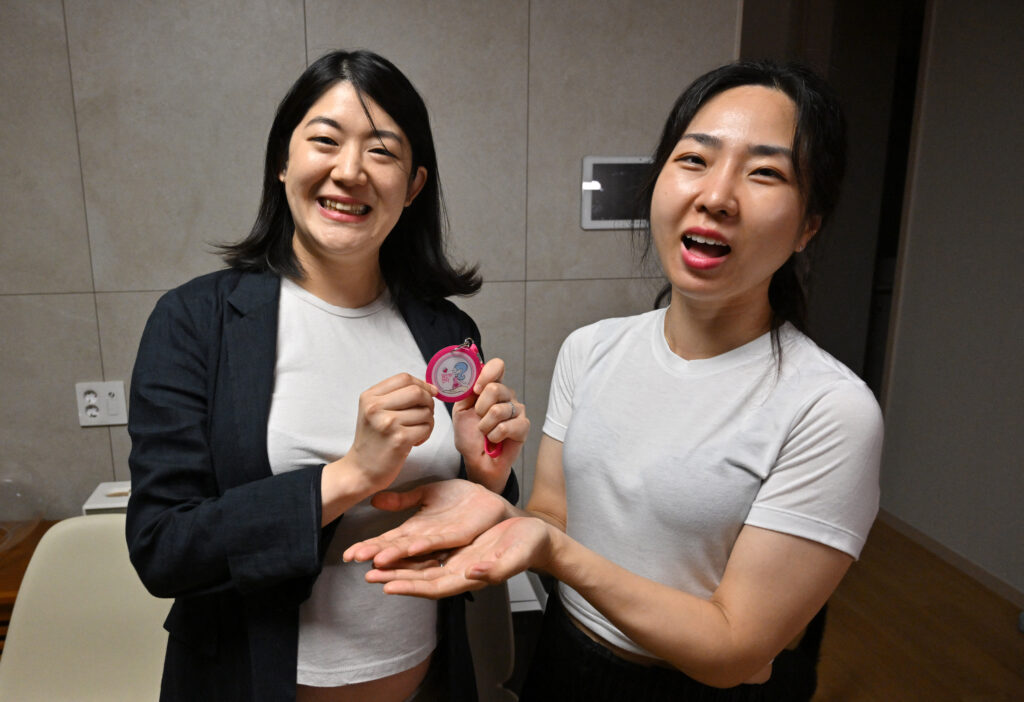
This picture taken on July 18, 2023 shows South Korean lesbian couple Kim Kyu-jin (L) and her wife Kim Sae-yeon (R) posing with a pregnant woman badge during an interview with AFP at their home in Seoul. South Korea has spent billions of dollars on policies to boost its birthrate. But when Kim Kyu-jin and her wife wanted to have a baby, they had to fly to Belgium. | Photo by Jung Yeon-je / AFP
South Korea has spent billions of dollars on policies to boost its birth rate. But when Kim Kyu-jin and her wife wanted to have a baby, they had to fly to Belgium.
Legally, South Korea considers Kim single, despite her 2019 wedding — ceremony in Seoul, legal registration in New York City — because the country does not recognise same-sex unions. Seoul city authorities declined to register her marriage.
So when the happy South Korean couple decided they were ready to have a baby, their domestic options were limited: single people are typically deemed ineligible to adopt and sperm banks are designed for heterosexual married couples with fertility issues.
But Kim Kyu-jin and her wife Kim Sae-yeon — they share the same last name by coincidence — decided to try anyway and, thanks to IVF using donor sperm in Belgium, Kyu-jin is now eight months pregnant.
Not easy
The South Korean couple plan to have the baby in their home country, at the hospital where Sae-yeon is a doctor and have decided to speak publicly to raise awareness of same-sex parenthood in South Korea.
Many Koreans believe they should “end unhappiness in our generation by not having children”, Kyu-jin said.
She did not think she would have children herself, especially because growing up gay in socially conservative South Korea “wasn’t easy”.
But now Kyu-jin and her wife feel they could do a good job as parents, even though in South Korea there is no legal route for them to become mothers together.
“This child will grow up with happy mothers. We believe there is a high probability that the child will be happy as well,” Sae-yeon said.
Practical hurdles
South Korea’s birthrate — 0.78 percent per woman — is among the lowest in the world. Seoul has poured billions of dollars into encouraging its citizens to have more babies but to no avail.
Policies include subsidised fertility treatments, cash bonuses and free childcare, but the government is only targeting heterosexual, married couples.
That means many would-be parents who are unmarried or in same-sex relationships are ignored.
The official approach reflects deep-seated stigmas against single parenthood, experts say, pointing to the fact that just 2.5 percent of all South Korean babies in 2020 were born out of wedlock.
The OECD average is around 40 percent.
In South Korea, people who try to parent “outside the conventional system” come in for a lot of hurtful criticism, Sae-yeon said.
“People are criticising and saying some people just shouldn’t have children,” she said.
There are also major practical hurdles.
Legally adopt her own child
Sae-yeon will have no legal parental rights to her child, she is ineligible for parental leave and will not be able to serve as the child’s legal guardian in cases such as medical emergencies.
The only way to change this would be for her to legally adopt her own child, itself tricky due to official reluctance to allow unmarried people to adopt.
The idea that she could have a baby only struck Kyu-jin after she spent time working in France. Her French boss, on learning she was a lesbian and married, asked if she was planning to start a family.
“I was taken aback since it was such a personal question. And I thought (lesbians having children) must be common here, if people would ask about it when meeting someone for the first time.”
A nationwide sperm shortage means long delays for IVF treatments in France, so the couple went to Belgium, where they received an anonymous donation.
‘Selfish’
The couple have been called “selfish” for having a child who could face discrimination due to their parents’ sexuality.
Kyu-jin and Sae-yeon said they might even consider emigrating if it proves too hard to raise their baby in South Korea.
“There are many warm-hearted people who worry about our child, who are concerned how much (emotional) hurt the child will experience,” Kyu-jin told AFP.
“But if these kind-hearted individuals can help make our society a little more inclusive for our child, there will eventually be no need for such concerns.”
Even the baby’s grandparents may not meet the new arrival at first — Sae-yeon does not currently have a full relationship with her parents, who did not come to the couple’s 2019 wedding.
“We all tried really hard, but (in the end), it just didn’t work out,” she said.
She hopes they will eventually accept her relationship with Kyu-jin and meet their grandchild.
“I don’t know how much time will have passed by then. But I think we’ll feel regretful for having missed so many fun and happy moments along the way.”
READ MORE:
Vatican says Catholic Church cannot bless same-sex unions

